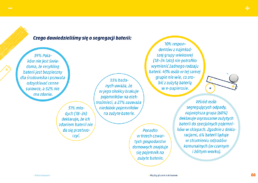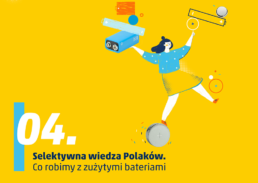New Interzero report "Between plus and minus"
On the occasion of Battery Day, we are publishing a research report as part of the Eco Without Cuts campaign "Between plus and minus - what do Poles know about batteries and how do they deal with their segregation?". The results are surprising. Despite being aware of the obligation to separate waste collection, many of us still fail to comply. Poles perceive batteries as harmful both during production and during storage. They also considered recycling to be dangerous to the environment. Despite many fears about batteries, we do not give much thought to the power source in our devices.
Never before in history have we produced and consumed so many batteries. According to forecasts by McKinsey & Company, their market will grow at 25% per year and, in the case of lithium-ion cells, could reach 30% of annual growth by 2030. This demand is being driven by the development of portable digital technologies, energy banks or electromobility, among other things. With this rapid progress of the battery industry, the question arises about the future of managing this new waste.
In our latest study entitled "Between plus and minus" We asked about Poles' habits regarding separate collection of waste, including hazardous waste. We also wanted to know their motivations and beliefs regarding battery recycling. The fact that a significant proportion of the respondents know how to handle used batteries correctly in their declarations is a positive sign. However, serious doubts arise when it comes to more specific questions. The lack of knowledge regarding the benefits of recycling batteries and concerns about the harmfulness of this process are particularly noteworthy. The fragility of supply chains and the limited deposits of raw materials in the European Union mean that we should treat used batteries and accumulators as a strategic resource. In fact, the lithium, nickel, manganese and graphite present in the cells are of critical importance. Obtaining these elements, regardless of the source, is expensive and risky, and substituting them in technologies at this stage of development seems simply impossible. The importance of recycling in this context is therefore both a measure to protect the environment and to ensure the security of Europe's raw materials.
What is also surprising in the "Between plus and minus" report is the group of young adults who were found to be less inclined towards ecological behaviour than older adults. Respondents under the age of 35 are not only less likely to separate waste, but are also more likely to doubt the sense of recycling. It is the responses of this group that should particularly stimulate reflection on the effectiveness of educational and legislative measures to date.
You can find out more from the press release HERE.




